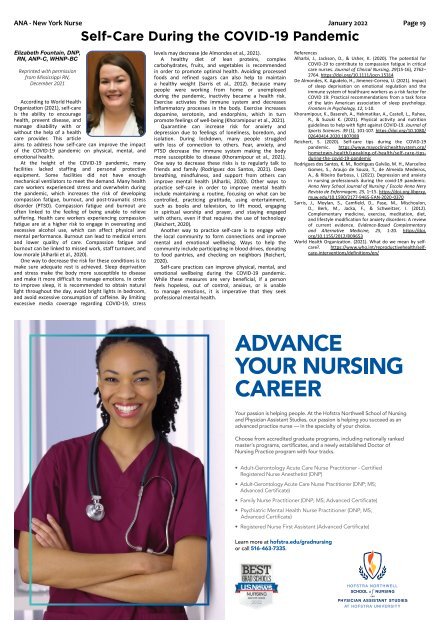New York Nurse - January 2022
You also want an ePaper? Increase the reach of your titles
YUMPU automatically turns print PDFs into web optimized ePapers that Google loves.
ANA - <strong>New</strong> <strong>York</strong> <strong>Nurse</strong> <strong>January</strong> <strong>2022</strong> Page 19<br />
Self-Care During the COVID-19 Pandemic<br />
Elizabeth Fountain, DNP,<br />
RN, ANP-C, WHNP-BC<br />
Reprinted with permission<br />
from Mississippi RN,<br />
December 2021<br />
According to World Health<br />
Organization (2021), self-care<br />
is the ability to encourage<br />
health, prevent disease, and<br />
manage disability with or<br />
without the help of a health<br />
care provider. This article<br />
aims to address how self-care can improve the impact<br />
of the COVID-19 pandemic on physical, mental, and<br />
emotional health.<br />
At the height of the COVID-19 pandemic, many<br />
facilities lacked staffing and personal protective<br />
equipment. Some facilities did not have enough<br />
mechanical ventilators to meet the demand. Many health<br />
care workers experienced stress and overwhelm during<br />
the pandemic, which increases the risk of developing<br />
compassion fatigue, burnout, and post-traumatic stress<br />
disorder (PTSD). Compassion fatigue and burnout are<br />
often linked to the feeling of being unable to relieve<br />
suffering. Health care workers experiencing compassion<br />
fatigue are at a higher risk to engage in overeating and<br />
excessive alcohol use, which can affect physical and<br />
mental performance. Burnout can lead to medical errors<br />
and lower quality of care. Compassion fatigue and<br />
burnout can be linked to missed work, staff turnover, and<br />
low morale (Alharbi et al., 2020).<br />
One way to decrease the risk for these conditions is to<br />
make sure adequate rest is achieved. Sleep deprivation<br />
and stress make the body more susceptible to disease<br />
and make it more difficult to manage emotions. In order<br />
to improve sleep, it is recommended to obtain natural<br />
light throughout the day, avoid bright lights in bedroom,<br />
and avoid excessive consumption of caffeine. By limiting<br />
excessive media coverage regarding COVID-19, stress<br />
levels may decrease (de Almondes et al., 2021).<br />
A healthy diet of lean proteins, complex<br />
carbohydrates, fruits, and vegetables is recommended<br />
in order to promote optimal health. Avoiding processed<br />
foods and refined sugars can also help to maintain<br />
a healthy weight (Sarris et al., 2012). Because many<br />
people were working from home or unemployed<br />
during the pandemic, inactivity became a health risk.<br />
Exercise activates the immune system and decreases<br />
inflammatory processes in the body. Exercise increases<br />
dopamine, serotonin, and endorphins, which in turn<br />
promote feelings of well-being (Khoramipour et al., 2021).<br />
Quarantine can increase risk for anxiety and<br />
depression due to feelings of loneliness, boredom, and<br />
isolation. During lockdown, many people struggled<br />
with loss of connection to others. Fear, anxiety, and<br />
PTSD decrease the immune system making the body<br />
more susceptible to disease (Khoramipour et al., 2021).<br />
One way to decrease these risks is to regularly talk to<br />
friends and family (Rodriguez dos Santos, 2021). Deep<br />
breathing, mindfulness, and support from others can<br />
improve mental health (Alharbi, 2020). Other ways to<br />
practice self-care in order to improve mental health<br />
include maintaining a routine, focusing on what can be<br />
controlled, practicing gratitude, using entertainment,<br />
such as books and television, to lift mood, engaging<br />
in spiritual worship and prayer, and staying engaged<br />
with others, even if that requires the use of technology<br />
(Reichert, 2020).<br />
Another way to practice self-care is to engage with<br />
the local community to form connections and improve<br />
mental and emotional wellbeing. Ways to help the<br />
community include participating in blood drives, donating<br />
to food pantries, and checking on neighbors (Reichert,<br />
2020).<br />
Self-care practices can improve physical, mental, and<br />
emotional wellbeing during the COVID-19 pandemic.<br />
While these measures are very beneficial, if a person<br />
feels hopeless, out of control, anxious, or is unable<br />
to manage emotions, it is imperative that they seek<br />
professional mental health.<br />
References<br />
Alharbi, J., Jackson, D., & Usher, K. (2020). The potential for<br />
COVID-19 to contribute to compassion fatigue in critical<br />
care nurses. Journal of Clinical Nursing, 29(15-16), 2762–<br />
2764. https://doi.org/10.1111/jocn.15314<br />
De Almondes, K. Agudelo, H., Jimenez-Correa, U. (2021). Impact<br />
of sleep deprivation on emotional regulation and the<br />
immune system of healthcare workers as a risk factor for<br />
COVID 19: Practical recommendations from a task force<br />
of the latin American association of sleep psychology.<br />
Frontiers in Psychology, 12, 1-10.<br />
Khoramipour, K., Basereh, A., Hekmatikar, A., Castell, L., Ruhee,<br />
R., & Suzuki K. (2021). Physical activity and nutrition<br />
guidelines to help with fight against COVID-19. Journal of<br />
Sports Sciences. 39 (1), 101-107. https://doi.org/10.1080/<br />
02640414.2020.1807089<br />
Reichert, S. (2020). Self-care tips during the COVID-19<br />
pandemic. https://www.mayoclinichealthsystem.org/<br />
hometown-health/speaking-of-health/self-care-tipsduring-the-covid-19-pandemic<br />
Rodrigues dos Santos, K. M., Rodrigues Galvão, M. H., Marcelino<br />
Gomes, S., Araujo de Souza, T., de Almeida Medeiros,<br />
A., & Ribeiro Barbosa, I. (2021). Depression and anxiety<br />
in nursing professionals during the covid-19 pandemic.<br />
Anna Nery School Journal of Nursing / Escola Anna Nery<br />
Revista de Enfermagem, 25, 1–15. https://doi-org.libprxy.<br />
muw.edu/10.1590/2177-9465-EAN-2020-0370<br />
Sarris, J., Moylan, S., Camfield, D., Pase, M., Mischoulon,<br />
D., Berk, M., Jacka, F., & Schweitzer, I. (2012).<br />
Complementary medicine, exercise, meditation, diet,<br />
and lifestyle modification for anxiety disorders: A review<br />
of current evidence. Evidence-Based Complementary<br />
and Alternative Medicine, 25, 1-20. https://doi.<br />
org/10.1155/2012/809653<br />
World Health Organization. (2021). What do we mean by selfcare?.<br />
https://www.who.int/reproductivehealth/selfcare-interventions/definitions/en/

















